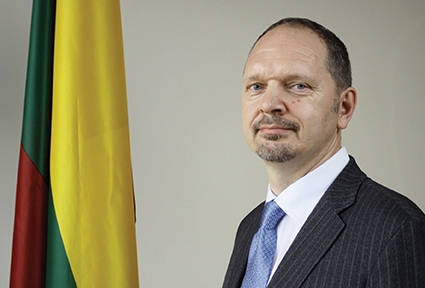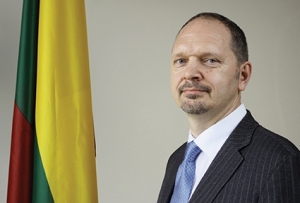INTERVIEW: Lessons from the Baltics
Last weekend was critically important not only for Georgians. Voters in Lithuania, which is a staunch ally of Georgia on its path to European integration, also took to the polls to elect the country’s new parliament.
GEORGIA TODAY sat down with the Lithuanian Ambassador Giedrius Puodziunas to discuss the two elections in comparative perspective, and draw parallels and contrasts between the two partners.
Both Georgia and Lithuania celebrate more than 25 years of independence. What distinguishes and what unites the two countries in terms of political development?
First and foremost, it is necessary to emphasize the common fundamental experience of both Lithuanians and Georgians in their aspirations for self-determination. The 1989 April 9 tragedy in Tbilisi, and the 1991 January events in Vilnius became embedded in the collective memory of the two Peoples. We both paid a high price for our liberty, and it remains a driving force in our political aspirations. Notwithstanding, there were some crucial differences. Lithuania adopted a staunch Europe-oriented course really early in the 1990s, which was followed by series of ambitious reforms. The logical conclusion of these reforms was the integration of Lithuania in the EU and NATO by 2004. In Georgia’s case, the economic and political development was hindered because of the civil war, which has political repercussions to this day. Nonetheless, it is crucial to bear in mind that today Georgia is the only country in the South Caucasus region that made significant progress in the EU Association Agreement earlier this year. Georgia is also a major Transatlantic partner, as reaffirmed in the Bucharest and Warsaw summits. Thus, despite the initial difficulties over the first decade of independence, today Georgia possesses all the instruments necessary for further EU and NATO integration.
This weekend has been crucial for the two countries, as both Georgians and Lithuanians elected their legislators. Could you compare and contrast the political climate in the two countries?
Free, fair and transparent elections are key to any functioning democracy. As reported by numerous observers, this year’s poll in Georgia, in spite of several irregularities, conforms with democratic standards and is a step in the right direction. The increasing polarization of the leading political parties, however, might eventually prove to be counter-productive. Naturally, political competition is a fundamental part of the democratic process. Notwithstanding, there is a need for a clear consensus over Georgia’s broader strategic goals. Lithuania’s bid to become a member of the EU and NATO was energized by a memorandum over strategic goals, signed by Lithuanian political parties. This has conditioned for a more productive political environment as far as the European and Transatlantic integration processes are concerned. In the context of the October 9 Seimas (Parliament of Lithuania) elections, the key values of this agreement remain intact, thus reaffirming Lithuania’s European course. In my opinion, the key political parties in Georgia should aim for a similar manifestation of unity in terms of foreign and defense policy. The coordination and continuity of these goals is of paramount importance, and Lithuania’s positive experience in this field could serve as an example.
Democracy promotion in the EU Eastern Partnership countries remains a key principle of Lithuanian foreign policy. What concrete steps did Lithuania take in encouraging democratic processes in Georgia?
Rule of law, respect for human rights and other similar postulates serve as pillars of the European Union, hence there are certain criteria to be met if a country wishes to accede to the European Union. From our own experience, we as Lithuanians can attest that it is not easy to meet these strict standards. Thus, Lithuania aims to share its positive experience with colleagues in Georgia, and the range of cooperation is multi-layered. This includes the intergovernmental Commission of European and Euro-Atlantic Integration, which serves as a medium for exchange of relevant information. I am particularly proud of the intense cooperation between Lithuanian and Georgian municipalities on a local level. Lithuania is involved in numerous assistance development projects in Georgian regions, specifically pertinent to education, women empowerment and relief to internally displaced persons. The Georgian and Lithuanian cooperation is very intense and, I must say, not limited to the institutional level. Georgians are keen on adopting the positive experience of Lithuania in their own country, and so far have been very successful in doing so.
What are the most problematic points that should be addressed with respect to the Eastern Neighborhood policy?
European integration is not an easy and straightforward process. It took years of dedicated work for Lithuania and other Baltic States to fulfil the formal requirements of accession, which were not always self-explanatory. In the 1990s, full integration into the European Union seemed almost utopian for most Lithuanians. Today, they can attest that the work and even the sacrifices Lithuania made in its European aspirations are already giving returns. Lithuania and the Baltic States can be described as success stories in implementing ambitious reforms. The path of European integration has been a recipe for success for these countries. Looking at Georgia today, it is one of the most progressive Euorpean partners among the Eastern Neighborhood countries, even though there is still room for improvement. The Georgian people must realize that the reforms need to be implemented not merely to fulfill the requirements of membership in the EU and NATO, but for the good of their country. It is not only an implementation of institutional schemes working in practice, but also a conscious process, which makes the country more fair, effective, democratic and liveable. Some of the problematic points are pertinent to some basic yet fundamental aspects of life, such as the appalling environmental record, as Georgia ranks 111th under the Environmental Performance Index. Hence, it is crucial to bear in mind that European integration is not only relevant on the institutional level, it starts in one’s back yard.
What are the prospects of bilateral cooperation between Lithuania and Georgia?
I have no doubt that the mutual sympathy between the two nations is here to stay, notwithstanding the geographical distance and cultural and linguistic differences. I believe that Lithuania’s role in opening Europe’s doors to Georgia and vice versa is not a single issue question. It builds trust and cooperation, thus conditioning for vibrant and intense bilateral relations, ranging from cultural exchange to intense business ties and trade.
Zygimantas Kapocius












